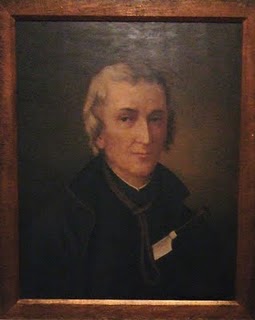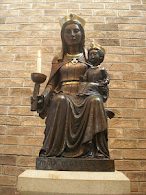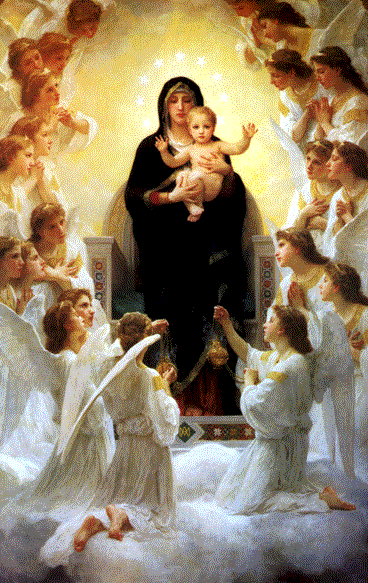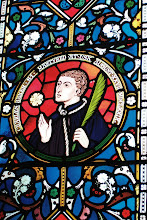In 1638, Morgan and Margaret (Pritchard) Lewis died of fever. David decided to beco
 me a priest and, after his parent’s death and with the financial assistance of Fr Charles Gwynne (alias Brown), he entered the English College in Rome. Fr Gwynne, Rector of the Jesuit College at the Cwm, had obtained from his uncle, Hugh Owen, funds for maintaining a Welsh Scholar at Rome. David Lewis was ordained priest in July 1642 and in April of 1645 he entered the Jesuit Novitiate at Sant’ Andrea. Fr Lewis was sent to Wales in 1647 but was soon recalled to Rome to become Spiritual Director at the College there. However, in 1648 he returned to his homeland and the College of St Francis Xavier at the Cwm. For more than thirty years Fr David Lewis laboured for the people of Monmouthshire and the Welsh Marches. He served two terms as Rector of the College, commonly known as ‘The Cwm’.
me a priest and, after his parent’s death and with the financial assistance of Fr Charles Gwynne (alias Brown), he entered the English College in Rome. Fr Gwynne, Rector of the Jesuit College at the Cwm, had obtained from his uncle, Hugh Owen, funds for maintaining a Welsh Scholar at Rome. David Lewis was ordained priest in July 1642 and in April of 1645 he entered the Jesuit Novitiate at Sant’ Andrea. Fr Lewis was sent to Wales in 1647 but was soon recalled to Rome to become Spiritual Director at the College there. However, in 1648 he returned to his homeland and the College of St Francis Xavier at the Cwm. For more than thirty years Fr David Lewis laboured for the people of Monmouthshire and the Welsh Marches. He served two terms as Rector of the College, commonly known as ‘The Cwm’.Under the anti-Catholic laws of the time, being a Catholic was dangerous and being a Catholic priest was even more dangerous! The Welsh were, for the most part, tolerant of their Catholic neighbours, friends, and, in many cases, family members, who tenaciously clung to ‘the Old Faith’. The Catholics were commonly known by the lovely name of the ‘plant Mair’, that is ‘children of Mary’. However, there were those who, harbouring fierce hatred of Catholics, sought to eradicate them entirely. Consequently, the priests had to be very careful so as not to bring suffering on themselves or those who aided them. For this reason, Fr Lewis was in the habit of making dangerous journeys in the dead of night in order to care for his flock. The compassion and goodness of Fr David Lewis was not limited to Catholics only and his great kindness to all earned for him the name ‘Tad y Tlodion’, ‘Father of the Poor’.
For many generations the wealthy Morgans of Llantarnam were loyal Catholics. They were instrumental in the establishment of the Jesuit College at the Cwm and, as recusants, regularly paid heavy fines for themselves and others of their household who were fined for non-attendance at Protestant Services. They also maintained a Catholic Chapel in their home. Lady Frances Morgan was an aunt of Fr David Lewis and for a time he lived with the family at Llantarnam. From this base he brought the comfort of religion to the careworn Catholics of the area and regularly celebrated Holy Mass for them in the Morgan Chapel.
The Popish Plot was first brought to the attention of the King, Charles II, on 13th August 1678. The Popish Plot, also known as the Oates Plot, was the invention of a reprobate, the convicted perjurer Titus Oates. Charles did not believe a word of the so called ‘plot’ but certain politicians seized upon this opportunity to enforce the anti-Catholic Statutes and Laws which were still in force but not always acted upon. Considering the excommunication of Queen Elizabeth I, ill-advised Papal involvement with planned attacks upon England, and the failed Catholic plots of recent memory, it was not difficult for Oates and his partners in crime to convince the populace that King, country and the Protestant religion were endangered. It was easy to convince them that Catholics, led by the Jesuits, were plotting to kill the Protestant King and replace him with his Catholic brother, James. The Government offered a reward of £50 for the apprehension of any Catholic priest. By autumn 1668 the terror had begun. It spread throughout England and its foul fingers soon clutched at the ‘plant Mair’ in Wales.
 Perceiving the danger in which he placed the Morgans, Fr Lewis moved out of their home to a cottage nearby. It was at this cottage at Llantarnam that Fr Lewis was arrested on 17th November 1678. It was a Sunday morning and the priest had been preparing to say Mass. He was arrested by armed dragoons, sent by the uncompromising and fanatical hater of Catholics and persecutor of priests, John Arnold of Llanvihangel Crucorney. Arnold, a Member of Parliament and Justice of the Peace, offered his own reward of £200 for the capture of any priest. Arnold had always shown friendship to Fr Lewis and right up to his imprisonment, the Jesuit believed Arnold to be a friend. Sadly, bigotry is without honour.
Perceiving the danger in which he placed the Morgans, Fr Lewis moved out of their home to a cottage nearby. It was at this cottage at Llantarnam that Fr Lewis was arrested on 17th November 1678. It was a Sunday morning and the priest had been preparing to say Mass. He was arrested by armed dragoons, sent by the uncompromising and fanatical hater of Catholics and persecutor of priests, John Arnold of Llanvihangel Crucorney. Arnold, a Member of Parliament and Justice of the Peace, offered his own reward of £200 for the capture of any priest. Arnold had always shown friendship to Fr Lewis and right up to his imprisonment, the Jesuit believed Arnold to be a friend. Sadly, bigotry is without honour.Fr David Lewis was imprisoned at Monmouth until January 1679. He was then moved to the new County Gaol at Usk. After a fixed trial at Monmouth Assizes, David Lewis was found guilty of being a Catholic priest and of saying Mass. He was condemned to be hanged, drawn and quartered. This was the usual sentence meted out to traitors and to be a Catholic priest was considered High Treason. In the spring, Fr Lewis, along with several other priests, was ordered to London to be examined by the despicable Oates and his equally despicable co-conspirators. No evidence could be found to implicate Fr Lewis in the imaginary plot so he was sent back to Usk to await his execution.
On 27th August 1679, Fr David Lewis was taken from Usk Gaol, tied to a hurdle, head towards the ground, and dragged along the river path to the place of execution. Fr Lewis was hanged but, mercifully, allowed to die before he was cut down and his body mutilated and decapitated. He was not quartered. It is an indication of the love the people had for the martyred priest that the authorities permitted his remains to be reverently carried to the churchyard of the Priory Church of St Mary. Here he was interred near the door of the west porch of the church.

The Popish Plot resulted in the deaths of many innocent Catholics, both priests and lay people. Some were executed, some died in prison and some died on the run, hunted like animals in the bitter winter weather. The eighth and final Jesuit to be executed as a direct consequence of the warped and evil mind of Titus Oates, Fr David Lewis S J, was beatified in 1929. On 25th October 1970 he was canonised by Pope Paul VI as one of the Forty Martyrs of England and Wales. An annual pilgrimage to the grave of St David Lewis, the Last Welsh Martyr, takes place on the Sunday nearest to 27th August.
LINKS TO THIS POST: The Perjurer Titus Oates and Eight Jesuits (Part 1); (Part 2); (Part 3); (Part 4); (Part 5); (Part 6); (Part 7); (Part 8)








.JPG)

.JPG)






Just visiting to say "Hi".
ReplyDeletePraying for you and yours.
God bless.
Thank you, Breadgirl! I got your package and your kindness is most appreciated :) God bless you, my friend. I am keeping you in my prayers.
ReplyDeleteHello Victor
ReplyDeleteThank you for everything. We will have news tomorrow. I will be in touch. God bless you.
Hello Mary 333
ReplyDeleteThank you for letting me know. I am sorry I took so long to answer your comment but it is just a little hectic here at present. I hope your friends enjoy the books and the cards.
You are very welcome and I am delighted to be able to do it. God bless you and yours.